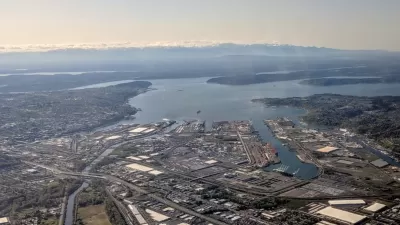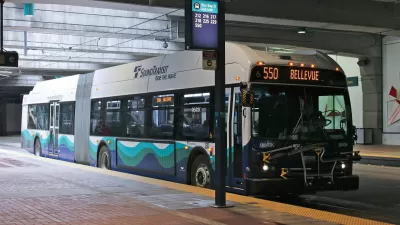Puget Sound voters strongly supported Sound Transit's sales tax measure to expand public transit while Washington state voters overwhelmingly rejected an Eyeman initiative to allow solo motorists to use carpool lanes during off-peak hours.
"Voters in Puget Sound counties...approved a $22.8 billion transit expansion package, the biggest in several decades. And state voters were saying that highway car pool and bus lanes should remain open only to car pools and transit, rejecting the latest Tim Eyman transportation initiative.
Sound Transit's Proposition 1 was its second attempt in two years to expand its rail and bus system beyond what it already operates or is building.
Voters rejected an even larger package a year ago that included a highway-im(Washington state) vprovement levy."
"The car pool lane measure, the Eyman-backed Initiative 985, would have opened car pool lanes to all traffic in nonpeak hours and required local governments to synchronize traffic lights on arterials.
But opponents said cities and counties already synchronize signals, and opening the car pool lanes to all traffic for part of the day could fill those lanes with more traffic."
From "Sound Transit hashing out details":
"Voters in the urban areas of King, Pierce and Snohomish counties approved the expansion measure Tuesday, with more than 58 percent of them voting yes. The approval gives the agency authority to collect an additional 0.5 percent increment of sales tax, starting next year and continuing for at least 27 years.
Thanks to Nathan Landau
FULL STORY: Sound Transit's package is passing; I-985 falling short

Maui's Vacation Rental Debate Turns Ugly
Verbal attacks, misinformation campaigns and fistfights plague a high-stakes debate to convert thousands of vacation rentals into long-term housing.

Planetizen Federal Action Tracker
A weekly monitor of how Trump’s orders and actions are impacting planners and planning in America.

In Urban Planning, AI Prompting Could be the New Design Thinking
Creativity has long been key to great urban design. What if we see AI as our new creative partner?

Cal Fire Chatbot Fails to Answer Basic Questions
An AI chatbot designed to provide information about wildfires can’t answer questions about evacuation orders, among other problems.

What Happens if Trump Kills Section 8?
The Trump admin aims to slash federal rental aid by nearly half and shift distribution to states. Experts warn this could spike homelessness and destabilize communities nationwide.

Sean Duffy Targets Rainbow Crosswalks in Road Safety Efforts
Despite evidence that colorful crosswalks actually improve intersection safety — and the lack of almost any crosswalks at all on the nation’s most dangerous arterial roads — U.S. Transportation Secretary Duffy is calling on states to remove them.
Urban Design for Planners 1: Software Tools
This six-course series explores essential urban design concepts using open source software and equips planners with the tools they need to participate fully in the urban design process.
Planning for Universal Design
Learn the tools for implementing Universal Design in planning regulations.
Appalachian Highlands Housing Partners
Gallatin County Department of Planning & Community Development
Heyer Gruel & Associates PA
Mpact (founded as Rail~Volution)
City of Camden Redevelopment Agency
City of Astoria
City of Portland
City of Laramie





























